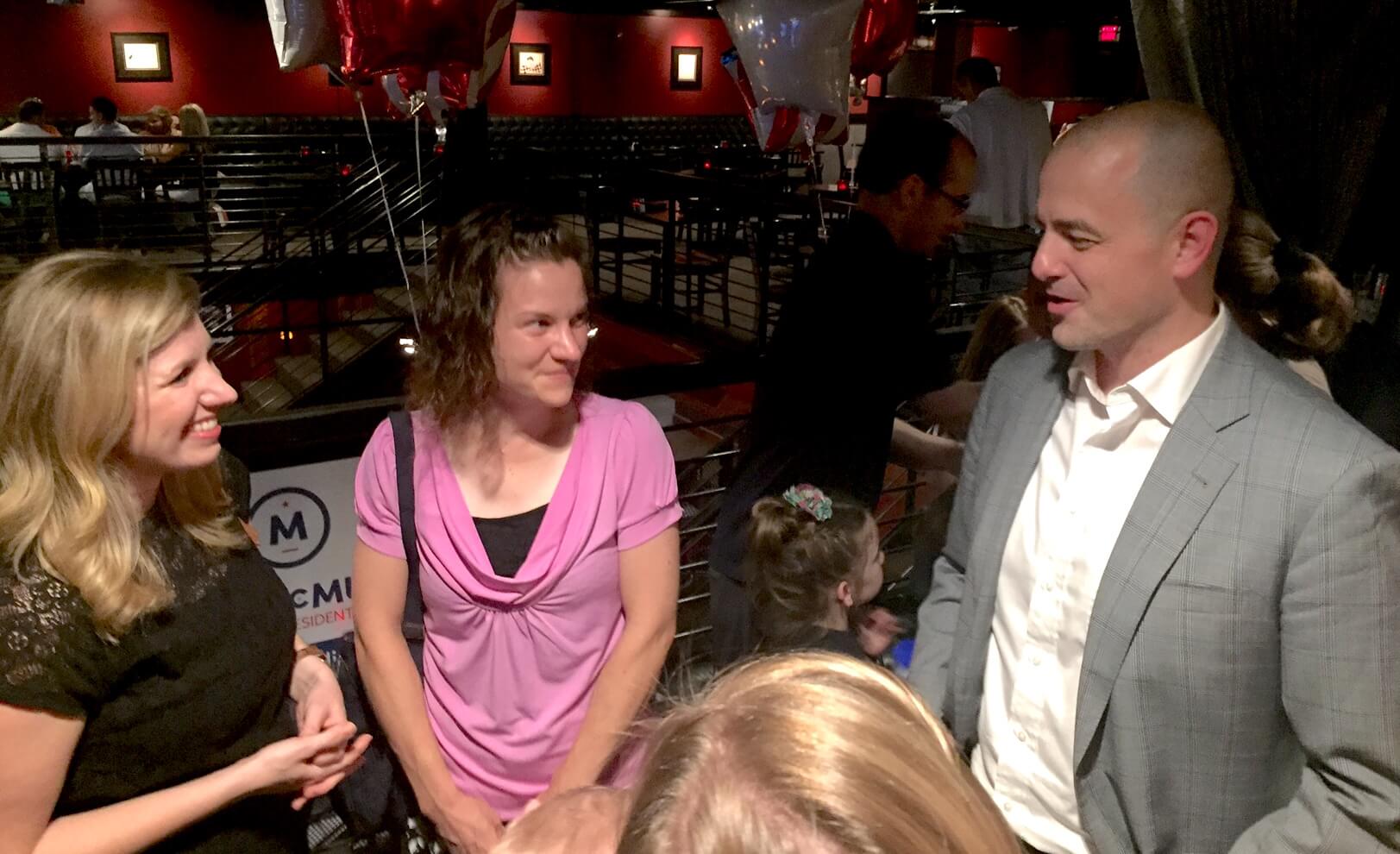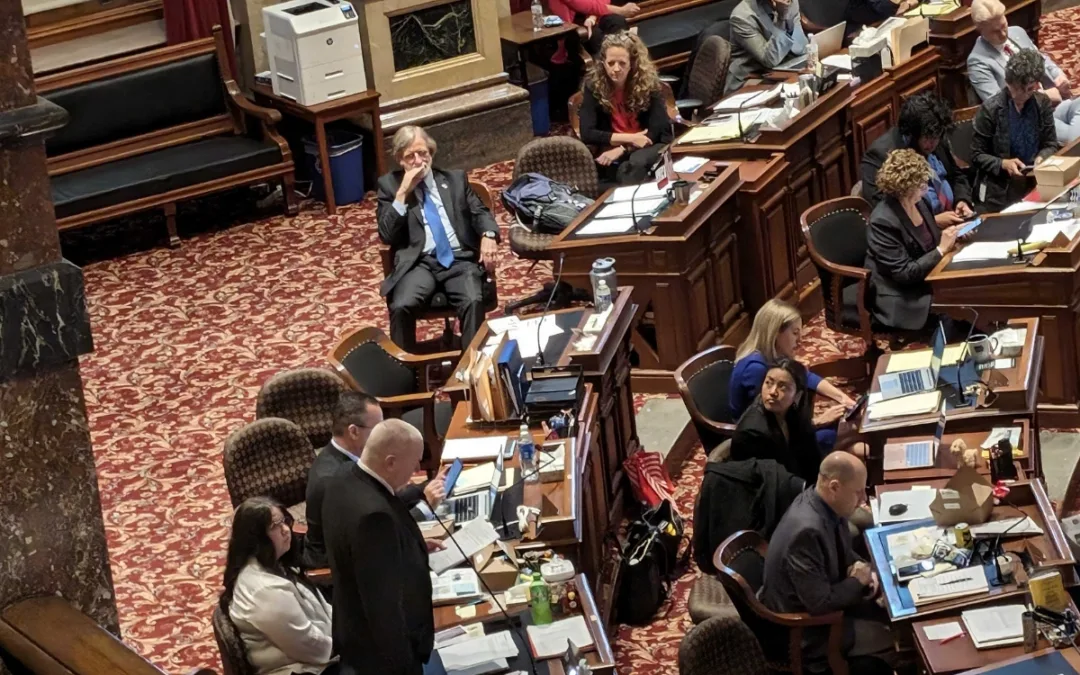
A lot of attention has focused on the Democrats’ difficulties with young voters – typically their best voting bloc – this year, but Republicans are dealing with a similar – if smaller – rebellion among their youthful backers. Donald Trump’s candidacy has many young Republicans and conservatives questioning their loyalty to the party and searching for different options.
Some of those young ex-Republicans showed up at an event for Evan McMullin in Des Moines this past week. McMullin, an independent candidate drafted to give frustrated rank-and-file Republicans a conservative choice, drew a notably young crowd to his Des Moines event at Americana. Of the about 45 people who attended, 3/4 were under 30 or young families, nearly all Republican ex-pats unsure where their political identity stood after the year of Trump.
Many Republicans in the #NeverTrump hope desperately that the Trump phenomenon is limited to this year alone, and that ideological conservatives return to power soon after 2016. A former CIA operative and top Republican House staffer, McMullin intends to be the salve for rank-and-file GOP voters to get through this year.
But for young conservatives and Republicans, who only have a few cycles of voting for the party under their belt, the potential damage of Trump is far greater. Some younger Republicans who are more progressive or tolerant on social issues like gay marriage were already having problems with the party’s focus. Now even more traditional conservative young people are having doubts with Trump’s apparent lack of grounding in any sort of ideology.
“I think there is a generation of young, evangelical and non-evangelical conservatives who recognize that Donald Trump is the monster that the generations before us created within the GOP, within Republicanism,” said Derek Wadle, 28, who used to vote for almost all Republicans. “Donald Trump is exactly what the GOP deserves given the way they’ve carried themselves for the last 20 years. We have so much to lose as the under-40 crowd under a Donald Trump presidency that I think the 40-and-older crowd doesn’t.”
Wadle’s personal breaking point came while watching the RNC convention this summer.
“As an evangelical, I can’t throw my support behind someone who says I don’t need the very thing I believe in,” Wadle said. “They laid out a platform [at the convention], then dismantled it piece by piece by piece. Every speaker he had was against everything the Republican Party stood for. It was fear-mongering, hate.”

A group of young voters listen to McMullin’s pitch
Mike Vandusseldorp, 31, came with Wadle to see what McMullin was like in person. A registered Republican who voted for Republicans his whole life, Vandusseldorp thought a Trump victory would be much more damaging to the Republican Party than four years of a Hillary Clinton presidency.
“I think the long-term consequence of having that person to represent your cause is going to be devastating,” Vandusseldorp said. “Donald Trump is not a stable person. The things he says is inflammatory and divisive and ridiculous. They make good television.”
Lydia Keithley, a 30-year-old music teacher in Des Moines, worried that the direction of the party was heading to place where she could no longer view herself as a Republican.
“There’s a brokenness in the Republican Party,” Keithley said, mentioning she caucused for Marco Rubio. “It just made me sad. I used to have more faith in politics … I’ve supported candidates that I don’t fully support. This time I just realized I can’t do that anymore. It was so extreme on both sides.”
Others, however, were ready to jump back on board so long as Trumpism was ousted from the party.
“Sure, give me a good candidate and I’m there,” said Grae Olson, 23, of Iowa City, who helped collect signatures to get McMullin on the ballot. “This is more I didn’t like the Republican candidate.”
Polling this year has shown a significant amount of young voters considering third party options this year. Gary Johnson picked up 13% of Iowans in the 18-29 age range in a recent CBS/YouGov poll, while a national Quinnipiac poll showed Clinton nearly tied with Johnson among 18-34-year-olds. McMullin is barely registering in polling – if he’s even asked about at all – but the young people who came out to support him reflect the growing trend their generation is showing toward the two-party system.
“I think that America needs another option. The two-party system is polarizing America more than we really are,” said Lindsey Herrera, 28, a middle school teacher who lives in Urbandale and has voted third party in the past. “I think the great thing about our generation is that people are pretty well-informed on the issues … I’m surprised by so many people who know as much as they do. People knowing that there are other candidates and go out and learn about them I think is a positive thing.”

A medical student worried Trump will deport his Muslim friends poses with McMullin
Part of that problem is with where the parties stand on the issue, but the overriding factor for young people seem to lay with the candidates’ personalities. While most attendees conceded that Clinton was well-qualified for the office, their total mistrust of her motivations kept them from considering her.
“I think a lot of what my generation is looking for is authenticity,” said Keithley. “And what we’ve seen, even if we’re ascribed to a different ideology, there’s a lot of bullshit that exists in both arenas. I think people are willing to set aside some issues they think are pretty important to support someone or something that seems very transparent and authentic.”
McMullin presented himself to the group of supporters much the way he has in his national appearances – as a competent, even-keeled, mainstream conservative. He spoke of placing “orginalist” conservatives on the Supreme Court, citing Antonin Scalia as a model. He related his time working in the CIA to how he saw countries cooperating in a dangerous world. But he also realized the difficult path for his independent bid, and suggested he’d have a good shot of winning if the election was thrown to a vote in the House in case no candidate reached 267 electoral votes.
Only an extreme, highly-unlikely scenario like that could actually get any of the third party candidates elected this year, but their impact on the major political parties going forward will be significant. The big question for Republicans is whether Trump’s divisiveness turns off their few remaining young voters for good. Because their problem isn’t just that Trump is the nominee. It’s that so many of their fellow Republicans voted to make him it.
by Pat Rynard
Posted 9/19/16
Politics

AEAs cutting workers in wake of Republican legislation
Iowa legislators said a new bill cutting money for agencies that help students with disabilities wouldn't affect services. But area education...

He said what? 10 things to know about RFK Jr.
The Kennedy family has long been considered “Democratic royalty.” But Robert F. Kennedy, Jr.—son of Robert F. Kennedy, who was assassinated while...
Local News

No more Kum & Go? New owner Maverik of Utah retiring famous brand
Will Kum & Go have come and gone by next year? One new report claims that's the plan by the store's new owners. The Iowa-based convenience store...

Here’s a recap of the biggest headlines Iowa celebs made In 2023
For these famous Iowans, 2023 was a year of controversy, career highlights, and full-circle moments. Here’s how 2023 went for the following Iowans:...





